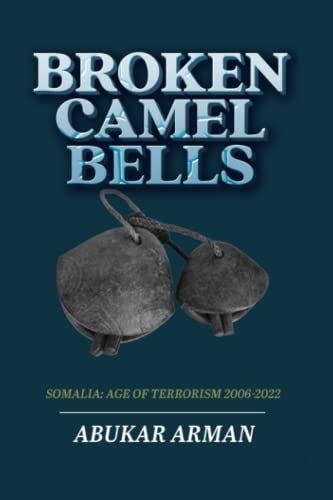Book Review: Broken Camel Bells
Somalia: Age of Terrorism 2006-2022
“A state that becomes free creates for itself enemies rather than friends. All those who took advantage of the tyrannical government and who fed off the wealth of the prince become hostile members; having lost the possibility of privilege, they can no longer live content, and each of them is forced to try to retrieve the tyranny in order to return to his former authority” - Machiavelli [Discourses, I.16]
Broken Camel Bells - Somalia: Age of Terrorism 2006-2022 by Abukar Arman
Self-Published. 191 Pages. 2023.
In Broken Camel Bells - Somalia: Age of Terrorism 2006-2022, Somali former diplomat and long-time political analyst Abukar Arman takes the reader through the recent history of Somalia, a nation whose very name is now synonymous with violence and anarchy. Since the fall Siad Barre’s government 1991 Somalia has been the quintessential “failed state,” plagued by corruption, clannism, piracy, odious debt, foreign invasion and meddling, and finally, radical Islam. In this text Arman, with incredible realism, clarity, and insight, shows how the world has failed Somalia and Somalis have failed themselves. Arman is a true Machiavellian, in that he has the appropriate cynicism about human nature and political actors, but at the same time, incredible optimism about what wisely managed civil government can accomplish. He hopes with this work to inspire a new generation of leaders and pull Somalia back from a climate of constant disaster so that the people can come together and form a stable, unified government which can solve Somalia’s problems and help the country heal and move past over 30 years of violence and instability which has seen some Somalis flee all over the world while others who stayed in the country died in enormous numbers from violence, starvation, and the many other causes of death associated with living in the aftermath of a complete societal breakdown.
To start with the style and format, this book is self-published but has no serious formatting or editing errors which would bother anyone who chooses to not nitpick. I don’t know if he tried to find a professional publisher, but it speaks to multiple unfortunate things about society that such an informative and useful text about one of the world’s most troubled regions should be self-published. It would be nice if the book contained an index, but I understand why the expensive and labor-intensive task was not undertaken [fun fact: Machiavelli’s father got his edition of Livy in return for making an index of place-names book, in an era when books were still very expensive, especially something as enormous as the extant Livy.] The organization of the book is a variation of the classic chronology popularized by Thucydides, but Arman’s innovation is that instead of being retrospective the book references his voluminous writing on Somalia’s problems to try to put the reader in the mindset of the time, or as he says at the end of the introduction, “Fasten your seat belt for a literary simulation through a decade and a half of the rise and fall of political Islam in Somalia” [6]. This style mostly works and is useful for understanding why the many different schemes to fix Somalia have failed, though at times it is unclear if he is directly using his writing from the time or speaking retrospectively. There is a small amount of tense confusion regarding if he is looking back from the year described or from the present. Each chapter begins with a sort of timestamp, such as “[We are still in 2013]” or “[We are now in 2014]” which does create the experience of being on a compelling journey through Somalia’s tribulations. Though the back cover says the book is for Somalia, at times the intended audience feels uncertain, as there are definitions of words anyone who would read this should know [such as Imam.] Alternately, if Somalia’s notorious “4.5 Formula” was properly described I missed it, and had to look it up on the internet for clarity, so there is some inconsistency in the knowledge level expected of the reader. [Regarding the 4.5 Formula, in short, it is an ethnic power-sharing system whereby the four major clans have one “share,” and all of the minor tribes together have half a share, hence 4.5.] Still, any reader with a general interest in Africa would find this text accessible.
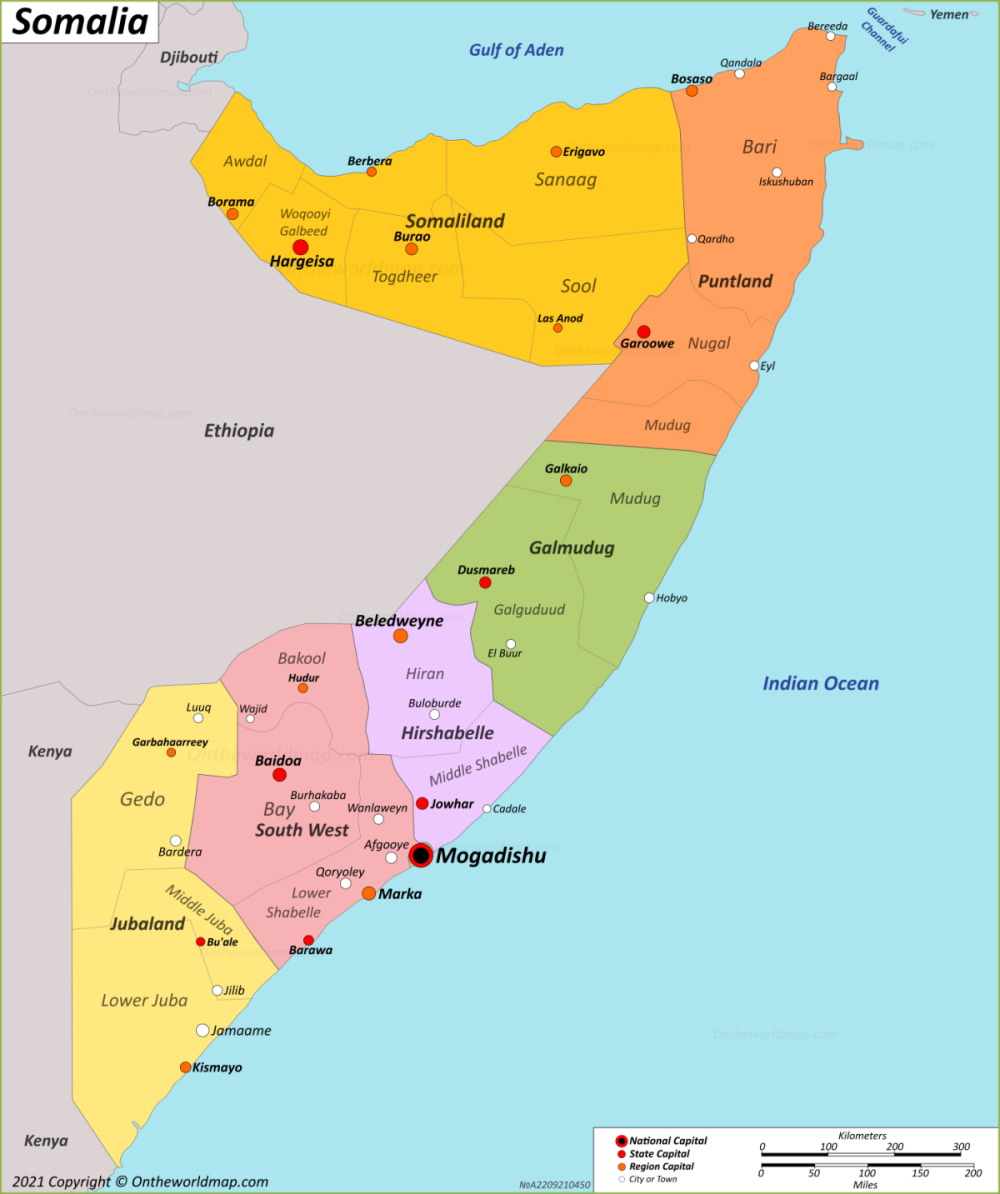
Arman’s metaphor of the camel bell expresses what has gone wrong with Somalia’s society. Somalis own more camels than any other people, and are deeply affectionate towards the animals. Traditional Somali camel bells are made of wood, and produce a gentle tocking sound which Arman describes as “an ancient rural global positioning system” [1]. The camel bells are put on the lead camel so that the others will follow, or are worn by young camels who may be skittish or not used to staying with the heard. By keeping the herd together and preventing young and restless camels from getting lost, the bells keep camels safe from predators- both animals and human bandits. Similar to a herd of camels without working bells, Somalis have lost their guidance and have been unable to act as a coherent nation, follow leaders, and keep the younger members of society in line that they may grow up to be productive members of society. Further, like much of Africa, Somalia has always been a combination of nomadic and sedentary tribes, but due to conflict much of the affluent sedentary urban class has fled the country, while young men from nomadic tribes have moved to the city to fight for their clans. In that way, Somalia has become substantially more nomadic in character. Arman contrasts the cultures as follows,
“Each has its positives and negatives…the former’s [nomad’s] mores are less tolerant, less strategic, less resource-sharing, less law-abiding, less nationalistic, more individualistic, more vain, more excitable, more violent, more motivated by instant gratification, and more dependent on zero-sum dominance.” [3]
Somalia’s transformation into a nomadic culture reminds me of what happened in Afghanistan after the Mongol invasion. Afghanistan, at the time called Bactria, had been a Hellenistic civilization with things like irrigation and higher education, but after the Mongol invasion only the nomadic people survived, and in many ways Afghanistan in 1900 was a less developed civilization than it had been 1000 years before.
When Somalia’s government fell in 1991 its society as a whole broke down; Arman would have been around 30, meaning when a man should be having children and entering some of the best years of his career suddenly all normalcy was gone. In the memoir The Zanzibar Chest, Africa journalist Aidan Hartley explains how Somalia’s national phone code didn’t work for years, and if you dialed it you would hear a sort of ghostly distress signal, he says, “An entire nation of people was lost, beyond reach, tumbled into an abyss.” In most ways, the collapse of Somalia mirrors the collapse of Yugoslavia which took place at the same time. However, “the West” decided that Yugoslavia should be torn apart and that Somalia should be “held together,” to the extent that what has happened in Somalia could be described in such a way. The large difference is that even though Somalia is a federal republic where different “clans” dominate different states, because the South Slavs are white people they are called “nations” and it is “nationalism” not “clannism” and is somehow more “civilized” even in the face of the same deprivations and barbarity. This sort of persistent “othering” of Somalia has made it all the more of a victim of the winds of history and the whims of foreign powers who see it as an example of the worst aspects of both Africa and Islam while failing to understand what would be required to rebuild a functional state.
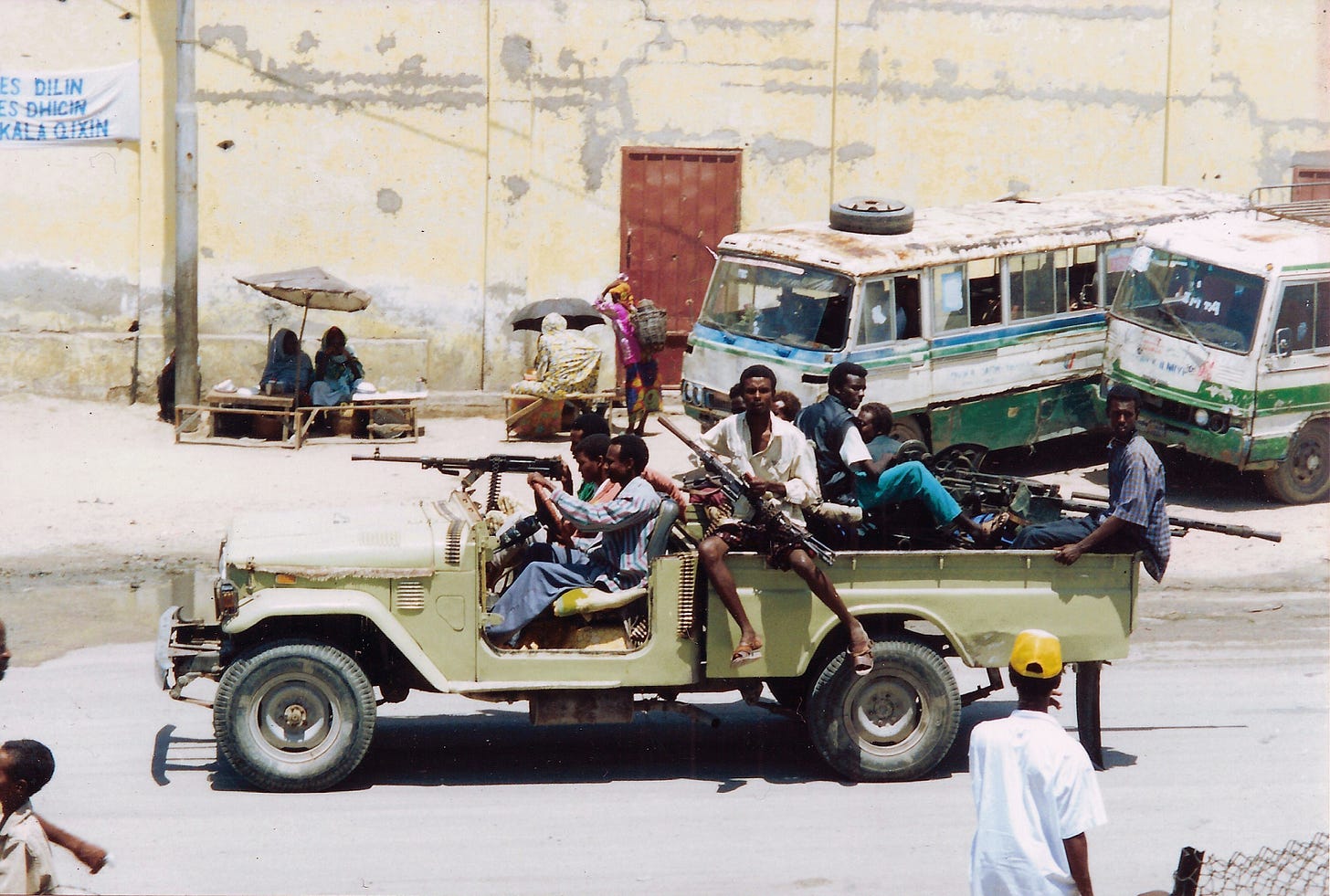
Our story, however, starts 15 years after the fall of government, when an Islamist movement known as the “Islamic Courts Union” took power in much of Somalia. As this was in 2006, at the height of the Global War on Terrorism, the rise of the ICU caused a great deal of international concern due to the West’s fear of “political Islam.” Though Arman is not an “Islamist” he has a clear understanding of something that people like Machiavelli and myself understand but too few others do: something can only be good public policy if it works, and public policy can only work if the public will accept it. Arman recognizes that after 15 years of brutal fratricidal violence, “Islam is the only thread that remains intact” [30]. The public did accept the Islamic Courts Union, as Somalis were desperate for any sense of justice and order. Unfortunately many of the judges were compelled by the kind of deranged extremism associated with radical Islam, and the ICU became notorious for things like chopping off the hands of thieves and banning watching sports. Still, Arman makes a compelling defense that moderate, wise Shariah can be a the basis of law in a peaceful and tolerant society. In contrast to the extremists who view Shariah as a way to use severe and arbitrary punishment to improve society, Arman writes,
“The ultimate goal of Shariah is to build a good society where, among other improved conditions, the security of the individual and that of a community is ensured, their properties are protected, and their dignity and respect are defended. Where the individual’s right to think freely and pursue personal ambitions are protected, where commerce is encouraged and education is provided, where the needy are cared for, and crime is all but eliminated.” [28]
The description, word for word, could also be said to be the goal of free government. This section shows two more insights which Arman possesses. The first, is that you can set reasonable goals and do your best, but government cannot fix all of society’s problems, it can only manage them. The second is that the same system that will work well under moderate and wise leadership, can be disastrous under extremist and foolish leadership. In this instance, the Islamic Courts were only as good as the individual judges, and lacking much oversight, particularly in backwater areas, there were severe abuses by extremist judges who believed society could only be fixed by prominent displays of legal violence.
Though Somalis were generally happy to have a degree of order, the outside world was not. Neighboring Ethiopia and Kenya in particular were concerned about the rise of political Islam in Somalia, and invaded the country to drive out the Islamic Courts in 2007. A hard-line faction, Al-Shabab aligned itself with Al Qaeda and seriously challenged what could be generously called the Somalian central government, causing Somalia to become theater for United States’ Global War on Terrorism in the time since. At this same time, a trite phrase came into being, which is “African solutions for African problems.” Like so much else, this idea failed Somalia, with Arman writing,
“It has proven no substantive value to the continent or its people. Contrary to what was originally intend, the phrase has been taken advantage of by domestic political sloganeers and foreign elements eager to advance zero-sum interests.” [87]
The idea that Africa would move past the post-Colonial era and solve its own problems sounds good, the issue is both that former Colonial powers are then just using proxies to do their bidding, and further those proxies have their own regional interests. [I referred to the French policy in West Africa as “The ‘African-Led’ White Man’s Burden” in my article about the western Sahel.] In this instance it just meant “front line states” like Ethiopia and Kenya moving into Somalia, carving out spheres of influence, manipulating the government, and opening up the country to new kinds of exploitation. Though the role of such states was supposed to be limited, in the longer run it did not work out that way. One of Somalia’s problems remains outside interests who do not understand the situation on the ground and are the most concerned with pacifying and exploiting Somalia, not allowing it to grow into a stable and productive state.
Since the fall of government, Somalia has primarily been a ward of outside powers. Most of all, Britain has represented Somalia’s interests at the UN, which is strange as historically Britain only briefly oversaw the the majority of the country following the Second World War. Somalia also suffers from a severe amount of dual citizens, around 1/3rd of their Parliament, who come back to Somalia from wealthy Western countries, whom Arman says, “See themselves as people on vacation, or at best, on a short-term tour of duty [128]. It is especially common for Somalis to have dual citizenship with the United States, Canada, or the Scandinavian countries. These politicians are even more disconnected from the problems in Somalia than is normal for politicians, and further have an easy escape from the country and bring with them foreign ideas and foreign governments who become very concerned about their well being if anything bad should happen. In short, they become a type of itinerant preachers of Western neo-liberal government who can leave at any time. Arman argues that these people are little different from the “guerilla diplomats” who populate the Mogadishu “Green Zone” [127]. Somalia’s previous President, known as Farmejo, was actually an American citizen working as a state bureaucrat in New York at the time he was originally appointed Prime Minister [he renounced his American citizenship in 2019.]
In Arman’s view, the only state which has done well with Somalia is Erdogan’s Turkiye, though Erdogan is frequently maligned in the West for what is considered his disruptive approach to foreign policy. However, he has avoided the pitfalls of other states and shown real interest in helping Somalia finally rebuild its national army. Arman recommends that Turkiye take over representing Somalia’s interests in front of the UN. Turkiye is a good choice for multiple reasons, the most important is that though the Ottomans once indirectly controlled some of the region, it does not have the history of colonizing the Horn of Africa of the European powers, nor of capturing the residents as slaves like the Arabs [though Istanbul did have the largest slave markets in the broader region for a long time.] Further, Arabs have a great deal of racism and ethnic chauvinism towards black Africans, considering themselves to be sort of the primary people and culture of Islam. It’s notable that though Turkiye is a major NATO ally, you would never hear from anyone in the West of it being a reliable partner to a weak state like Somalia.
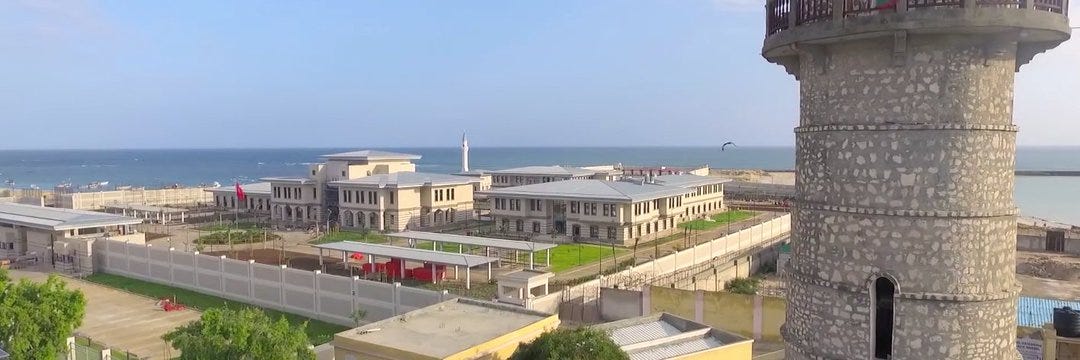
One notable gap in Arman’s otherwise consistent realism appears to be the status of the de facto independent Somaliland. Briefly, Somaliland is the part of internationally recognized Somalia which was long a British colony; it fought a war of independence in the late ‘80s and early ‘90s which was one of the events precipitating the fall of the Barre regime, and has been de facto independent since. Though it has many of the problems common to sub-Saharan Africa, Somaliland has had general peace for the last 32 years. I have no reason to have a strong opinion on Somaliland independence. However, as a realist I support recognizing Somaliland’s independence simply because it has successfully functioned as an independent state which guards its own borders, holds elections, pays state employees, and conducts foreign policy. Arman, on the other hand, considers the unity of Somalia to be important, including Somaliland. In the 2011 section of the text he speaks of “The urgency of a holistic Somali reconciliation that includes Somaliland” [53]. To his credit, it is clear that Arman wants to do this by mutual agreement, not by the Somali Armed Forces [undergoing an interminable “rebuilding” project] attempting to conquer the breakaway region. Still, I was unsatisfied that he didn’t elaborate on this topic, so I reached out to him through Twitter direct messages for further clarity. I asked, “do you think it is realistic bring Somaliland back into Somalia?” After an explanation of the most recent round of strife throughout the region, he gave me this response,
“If I were to answer the reunification question against this backdrop, my answer is: not under the current political dynamics. Divine intervention aside, it will get worse on both sides before it gets better, and before we could find visionary leaders who could ask: What is in our mutual interest? Or how can we co-exist peacefully?”
He indeed gets to the heart of the problem, which is that Somaliland stands to gain nothing from rejoining Somalia, though both could gain from peace, commerce, and honest friendship if they can reach a permanent agreement.
Over all, Broken Camel Bells is a remarkable small book that I recommend for anyone interested in Somalia, the Horn of Africa generally, or the Global War on Terrorism. Further, for students of political theory, it is a rare primary source on the challenges of seeking to build a functional civil government out of violence and chaos, and I don’t know when I will again have such a good opportunity to see these ideas applied to the modern real world. I am somewhat biased in that Arman’s views are quite close to my own- not ideologically but in terms of our understanding of how civil government functions and what is required to make a working state [as soon as I began reading, my immediate reaction was “I love the way this guy thinks.”] I feel quite bad for the author though, as I often feel like one of the only sane and competent people looking at American politics. It must be all the more maddening being the rational person trying to fix Somalia, but as he said at the beginning of the text, it was suggested he name the book “Haven’t I Told You So?” but did not, in part because “This is not a book about settling old scores with politicians of various shades of capacity that I worked with and gave up on a decade ago” [1]. However, for his well earned cynicism and frustration, one can see that Arman remains hopeful that his beloved country can come together and work towards a better future. That is much more likely if Somalis read Broken Camel Bells and take it to heart than if they don’t.
Arman ends with the following important message,
“Despite everything, I must remain optimistic; because pessimism leads to hopelessness; and hopelessness is a psychological dead-end. It is a dangerous place to be. So, I am confident that Somalia’s better days are ahead. But we cannot sit idle and let others micromanage us and expect things to work as we like. To attain political harmony, sustainable security, economic development, and regaining our sovereignty we must find or cultivate transformational leaders who are loyal to the nation and willing to sacrifice for their cause.” [190]
Broken Camel Bells can be purchased on Amazon.
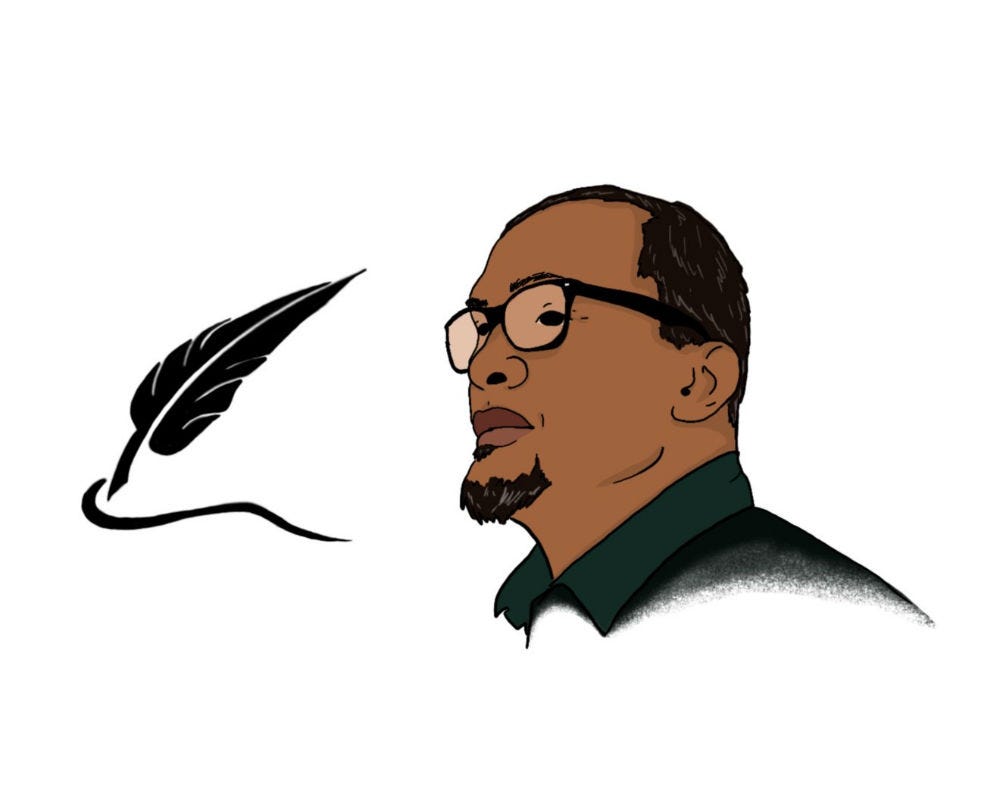
Thank you for reading! If you enjoyed this content please subscribe and share. My main content will always be free but paid subscriptions help me a huge amount [payment in Somali shillings preferred.] I have a tip jar at Ko-Fi where generous patrons can donate in $5 increments. Join my Telegram channel The Wayward Rabbler. My Facebook page is The Wayward Rabbler. You can see my shitposting and serious commentary on Twitter @WaywardRabbler.


